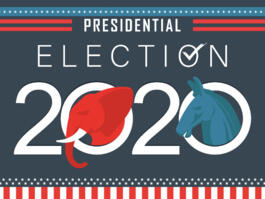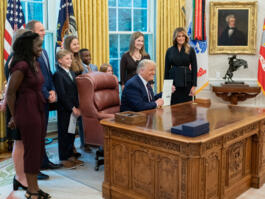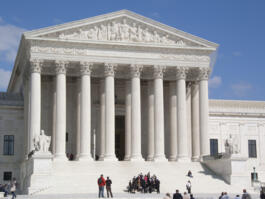Voters Strongly Reject Religious Litmus Test for Supreme Court Nominees
Some Democratic opponents of U.S. Supreme Court nominee Amy Coney Barrett are criticizing her conservative Catholic beliefs. But three-out-of-four voters say a candidate’s religious faith should not determine whether he or she can serve on the high court.
The latest Rasmussen Reports national telephone and online survey finds that just 16% of Likely U.S. Voters think a nominee’s religion should be a deciding factor in determining who sits on the Supreme Court. Seventy-three percent (73%) reject that position and say religious faith should not be a determining factor. (To see survey question wording, click here.)
Because the Catholic Church opposes abortion, 14% believe Catholics should be prohibited from sitting on the Supreme Court. Seventy-seven percent (77%) disagree.
Voters under 40 (26%) are far more likely than their elders (8%) to think Catholics should be barred from serving on the high court. Fifteen percent (15%) of Democrats agree, compared to nine percent (9%) of Republicans and 20% of voters not affiliated with either major political party.
Democrats (69%) oppose a religious litmus test for Supreme Court nominees nearly as strongly as Republicans (79%) and unaffiliated voters (73%).
(Want a free daily e-mail update? If it's in the news, it's in our polls). Rasmussen Reports updates are also available on Twitter or Facebook.
The survey of 1,000 Likely Voters was conducted October 8 and 11, 2020 by Rasmussen Reports. The margin of sampling error is +/- 3 percentage points with a 95% level of confidence. Field work for all Rasmussen Reports surveys is conducted by Pulse Opinion Research, LLC. See methodology.
Voters aren’t convinced that Barrett should sit on the Supreme Court, but a sizable majority expects her to be confirmed by the Senate.
Women believe even more strongly than men that religion should not be a deciding factor for Supreme Court nominees and that Catholics should not be barred from the court.
The younger the voter, the more likely they are to feel a nominee’s religious faith should be a determining factor.
Blacks favor prohibiting Catholics from serving on the Supreme Court more than whites and other minority voters do.
Among voters who believe religious faith should be a deciding factor, 41% think Catholics should be prohibited from sitting on the high court.
Angered by President Trump’s nomination of a new U.S. Supreme Court justice just weeks before Election Day, several prominent Democrats have suggested adding more members to the high court or imposing term limits on the justices if their party regains control of the Senate. Most voters continue to favor term limits for the Supreme Court but oppose packing it with more members.
Seventy-one percent (71%) of all Americans regard their religious faith as important in their daily lives. Sixty-one percent (61%) of these adults agree with U.S. Attorney General William Barr that “secular forces and their allies have marshaled all the forces of mass communication, popular culture, the entertainment industry and academia in an unremitting assault on religion and traditional values.”
Additional information from this survey and a full demographic breakdown are available to Platinum Members only.
Please sign up for the Rasmussen Reports daily e-mail update (it's free) or follow us on Facebook. Let us keep you up to date with the latest public opinion news.
The survey of 1,000 Likely Voters was conducted October 8 and 11, 2020 by Rasmussen Reports. The margin of sampling error is +/- 3 percentage points with a 95% level of confidence. Field work for all Rasmussen Reports surveys is conducted by Pulse Opinion Research, LLC. See methodology.
Rasmussen Reports is a media company specializing in the collection, publication and distribution of public opinion information.
We conduct public opinion polls on a variety of topics to inform our audience on events in the news and other topics of interest. To ensure editorial control and independence, we pay for the polls ourselves and generate revenue through the sale of subscriptions, sponsorships, and advertising. Nightly polling on politics, business and lifestyle topics provides the content to update the Rasmussen Reports web site many times each day. If it's in the news, it's in our polls. Additionally, the data drives a daily update newsletter and various media outlets across the country.
Some information, including the Rasmussen Reports daily Presidential Tracking Poll and commentaries are available for free to the general public. Subscriptions are available for $4.95 a month or 34.95 a year that provide subscribers with exclusive access to more than 20 stories per week on upcoming elections, consumer confidence, and issues that affect us all. For those who are really into the numbers, Platinum Members can review demographic crosstabs and a full history of our data.
To learn more about our methodology, click here.





